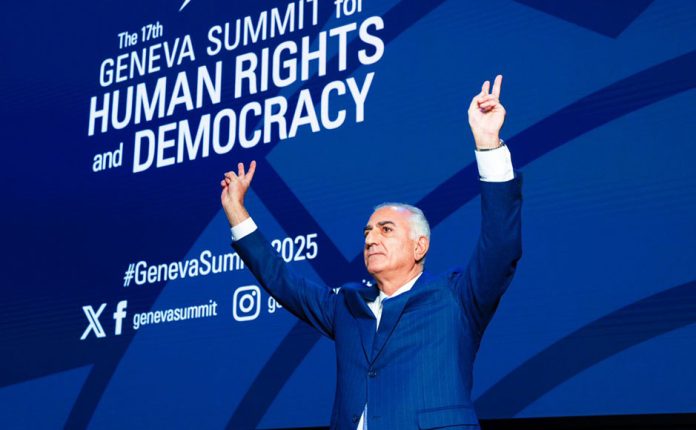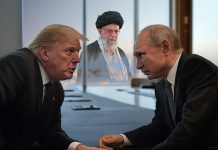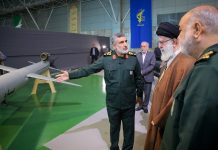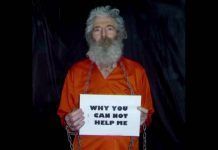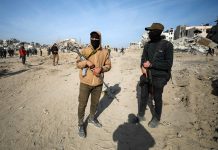Prince Reza Pahlavi offered to lead a movement for regime change in Iran during a Feb. 18 conference in Geneva hosted by the Geneva-based lobby group United Nations Watch.
The regime in Tehran has been increasingly challenged by opposition groups in recent years, following ongoing allegations of mass corruption, economic and environmental mismanagement, and human rights violations.
The annual conference — titled “The Geneva Summit for Human Rights and Democracy” and focused on urgent human rights concerns around the world — was sponsored by 25 human rights groups including UN Watch, the Center for a Free Cuba and the Freedom Rights Project.
Speakers at the event included:
- Garry Kasparov, the former world chess champion and human rights activist
- Edmundo González, the President-elect of Venezuela
- Mahan Mehrabi, the sister of Iranian political prisoner Mahmoud Mehrabi
- Maryam Diyor, the mother of 16-year-old Abolfazl Amir-Ataei, who was killed by the regime for joining Iran’s anti-government protests
- Saman Pouryaghma, who was blinded in one eye after being shot while protesting
- Massouda Jalal, the former Afghan Minister of Women’s Affairs and the first woman to run for President of Afghanistan
- Sebastien Lai, a democracy activist and the son of jailed pro-democracy media entrepreneur Jimmy Lai, and
- Tirad Badawi, the son of Raif Badawi, who has been banned from leaving Saudi Arabia for promoting liberalism.
“Today, we are presented with an historic opportunity. The regime is weaker than it has ever been. Its axis of resistance has been dismantled and its domestic legitimacy has evaporated. Now is the time to act,” Prince Reza said in his speech. “Therefore, at the call of my fellow Iranians, I am stepping forward to lead this movement and transition. Not for myself, nor for post or power, but to answer the call and do my duty as a patriot.”
Prince Reza then set out his plan to transition Iran away from a theocracy to a democratic government by such means as mobilizing grass roots organizations in Iran, uniting opposition groups in the diaspora, and asking all Group of 20 (G20) nations to impose a maximum pressure policy on the regime.
The U.S. resumed its maximum pressure policy on Iran on Feb. 4, after Donald Trump’s reelection as U.S. president. The policy includes economic sanctions, tariffs and measures to restrict the Islamic Republic’s nuclear program.
Prince Reza also thanked human rights activist Nazanin Afshin-Jam for organizing the attendance of anti-government protesters and their families at the event. Afshin-Jam moderated a panel at the conference titled “The Islamic Republic’s brutality against protesters,” which featured Mehrabi, Diyor and Pouryaghma as panelists.
The prince went on to name several political prisoners in Iran – Fatemeh Sepehri, Nasrin Shakarami, Nahid Shirpisheh and Manouchehr Bakhtiari – whose plight he felt had been ignored by mainstream human rights organizations.
There are currently more than 50 political prisoners sentenced to death by Iran’s judiciary, according to the Center for Human Rights in Iran (CHRI), including Ahmad Reza Djalali, an Iranian-Swedish disaster medicine doctor.
Djalali was the subject of an ‘empty chair’ session at the conference. Empty chairs are often used at events to draw attention to an individual connected to an important issue who cannot be present, and whose plight must be considered in the discussions.
“The Iranian people have endured more than four decades of suffering, yet their spirit remains unbroken. They are fighting not just for themselves but for the values of freedom, justice, and human dignity,” Prince Reza said. “This is not just about my nation’s survival, it is also about international stability and global peace. For as we have seen just in the last week from terrorist attacks to hostage taking, the Islamic Republic, despite its rhetoric in Davos and calls for a new deal, is still waging war on the free world. Until it is toppled, it will not stop.”
The full text of Prince Reza’s speech at the summit can be found below:
Ladies and gentlemen, friends, and tireless advocates for human rights:
Before I begin, I would like to thank the thousands of my fellow compatriots who have come from all over the world to be here today to demonstrate their love of Iran and their commitment to its liberation.
Being here in Geneva, the home of the United Nations Human Rights Council, makes it particularly special. I extend my sincere thanks to Dr. Neuer and his team for making this conference a beacon of hope for oppressed voices worldwide. I stand here on behalf of my compatriots, who have, for far too long, been silenced, not only by the tyrannical regime that occupies our country, but by the ideological bias that distorts the truth about Iran.
The story of the Islamic Republic is one of deception. This deception, coupled with their own arrogant assumptions, led leaders in the West and many in the media to portray Khomeini as a “saint”. They painted the revolution as one of justice and freedom. What followed was nothing short of hell on Earth. Even before taking power, Khomeini’s movement showed its true face. The Cinema Rex arson in Abadan, a terrorist attack orchestrated by his followers, killed over 400 innocent people. It was a sign of what was to come.
Once in power, the regime’s first targets were Iran’s most capable and patriotic citizens: military officers, business leaders, intellectuals, professionals, and public servants who had built a proud and modernizing nation. I knew many of them personally. Their murders were celebrated and even encouraged in revolutionary newspapers while ignored in Western ones.
Many of these men and women remain unknown to the world because they had no lobbyists or political sponsorship. Instead, they were buried in unmarked graves, and their families were denied even the dignity of mourning them. But their memory endures in the hearts of those who continue their fight, and in the resolve of Iran’s new generation.
Thereafter, the regime turned its war against Iranian women. The progressive family protection law was the very first one Khomeini revoked. The mandatory hijab law, imposed shortly after the revolution, became a tool of subjugation, symbolizing the Islamic Republic’s obsession with the control over women’s bodies and lives. However, from those very first days until today, Iranian women have been fighting back. But, let me be clear: Iranian women are not just fighting against the forced hijab. Their struggle is not about a piece of cloth: it is about reclaiming their equality and their country.
Brave women like Fatemeh Sepehri, Nasrin Shakarami, and Nahid Shirpisheh continue to resist, despite imprisonment, maltreatment, and relentless persecution. Yet I see that their names remain unfamiliar to many in this room. Why? Because some human rights organizations have allowed political bias and ideological preferences to determine which voices are amplified and which are silenced. This is unethical and unacceptable. All those fighting for a secular, democratic Iran deserve recognition, regardless of their background or political affiliations.
I am glad that the Geneva Summit is acting in that spirit, and I am thankful to them for hosting several of Iran’s bravest protesters and their families here with us today. Thank you Nazanin Afshin-Jam for facilitating their presence and to the Geneva Summit for hosting them.
Just as the Islamic Republic’s repression has targeted those of all ideologies, it has targeted those of all faiths. The Bahá’ís have been systematically persecuted, their leaders imprisoned, their cemeteries desecrated, and their youth denied education. Christians, particularly converts from Islam, live in constant fear. Like their Christian compatriots, Sunni Muslims, Jews, Sufis, and Zoroastrians face rampant restrictions and discrimination. The regime’s institutionalized antagonism with any diversity including religious diversity has threatened centuries of coexistence and unity unique to Iran.
The regime’s war on cultural heritage has also extended to targeting Iran’s pre-Islamic history. Sites like Persepolis and Pasargadae, symbols of Iran’s ancient civilization, are decaying under neglect and access to these sites is often blocked by the regime. By attempting to erase these symbols of national identity, the enemies of Iran seek to rewrite history and deprive Iranians of their rich heritage.
Even the creative souls of Iran are not safe. Musicians, artists, poets, who are the very heart of Iran’s culture, risk the death sentence for daring to express themselves.
The Islamic Republic’s war on all strata of Iranian society has targeted communities across our nation, across provincial, linguistic, and tribal lines. But despite all its attempts, it shall not divide it.
We are not just fighting against the Islamic Republic. We are fighting for Iran. So let me be clear: we will never, ever allow our nation to be divided.
We see this on the streets of cities across Iran as a nation has risen in unity. The protests of 2017 and 2019 marked a fundamental shift. Iranians no longer chanted for reform; they demanded the end of the Islamic Republic. A decade after the Green Movement sought to reclaim its stolen votes, the generation of 2017 and 2019 is fighting to reclaim its stolen country; and they have paid a heavy price. In November 2019, the regime massacred over 1,500 protesters, many shot at close range. Thousands were arrested, tortured, or disappeared.
Then came the Women, Life, Freedom uprising in 2022, ignited by the murder of Mahsa Amini. The regime and its apologists tried to frame the movement along ethnic lines, but Mahsa’s own mother called her “the daughter of Iran.” Protesters responded by chanting: “From Zahedan to Kordestan, I give my life for Iran.” This is the voice of a unified nation.
Despite brutal crackdowns and internet blackouts, the resistance continues. Manouchehr Bakhtiari, who lost his son Pouya in the protests, remains relentless in his fight for justice from inside his jail cell. His courage embodies the spirit of a people who refuse to be broken.
But the Islamic Republic’s crimes do not stop at Iran’s borders. The regime uses its embassies and so-called “cultural centers” as bases for espionage and terrorism across Europe. When it cannot reach dissidents abroad, it takes foreign citizens hostage inside Iran, holding them for ransom in a game of political blackmail.
These are the crimes the world knows about. But there are many more, often overlooked, such as the regime’s destruction of Iran’s environment. I consider environmental justice as one of my compatriots’ human rights.
Decades of corruption and mismanagement have created ecological disasters that threaten millions. Lake Urmia, once the largest saltwater lake in the Middle East, has nearly vanished, triggering salt storms that devastate farmlands and cause respiratory illnesses. Rivers like Zayandeh Rood have dried up, leaving farmers without water. In Khuzestan, where water has flowed for centuries, water shortages have led to repeated protests, each brutally suppressed.
Air pollution in Tehran and Ahvaz is among the worst in the world, often reaching toxic levels, forcing school and business closures. And those who dare to speak out — environmentalists like Kavous Seyed-Emami — are imprisoned or murdered.
Meanwhile, a country that sits on the world’s second-largest gas reserves experiences nationwide blackouts. Patients die in hospitals, businesses collapse, and families are left in darkness.
Even the most basic of necessities, including food to eat, have become luxuries available to the privileged few. In what should be one of the world’s richest countries, a growing number of my compatriots can barely afford to buy bread, let alone meat.
This is all a consequence of a regime that loots and pillages rather than governs. But what is caused by the Islamic Republic can be solved by its removal.
Today we are presented with a historic opportunity. The regime is weaker than it has ever been. Its axis of resistance has been dismantled and its domestic legitimacy has evaporated. Now is the time to act.
Therefore, at the call of my fellow Iranians, I am stepping forward to lead this movement and transition. Not for myself, nor for post or power, but to answer the call and do my duty as a patriot. My strategy for dismantling this regime and rebuilding Iran is clear:
-
- mobilizing grassroots networks inside Iran,
- uniting the diaspora,
- pressuring G20 governments to impose maximum pressure on the regime while providing maximum support to the people,
- splitting the regime and encouraging defections,
- and preparing for political stabilization, democratic elections, and Iran’s economic development and reconstruction.
And so, ladies and gentlemen, I bring you a message from a nation in chains. The Iranian people have endured more than four decades of suffering, yet their spirit remains unbroken. They are fighting not just for themselves but for the values of freedom, justice, and human dignity.
This is not just about my nation’s survival, it is also about international stability and global peace. For as we have seen just in the last week from terrorist attacks to hostage taking, the Islamic Republic, despite its rhetoric in Davos and calls for a new deal, is still waging war on the free world. Until it is toppled, it will not stop.
As I have traveled the continent for the past two weeks, I have spoken with government leaders of all parties and all stripes. I know Iranians and their democratic cause have many friends across Europe and that their number is growing. But to those who seek to silence us or stand in our way, I say: we are not waiting for your green light.
The Iranian people do not ask for your pity. They ask for your partnership. Our question is: will you stand with us?
Thank you.
OPINION: The Solution to the ‘Iran Problem’ is Regime Change
Regime Change Is Only Solution For Iran, Say DC Conference Speakers
Prince Reza Pahlavi : ‘The Alternative to the Islamic Republic is the Iranian nation’

